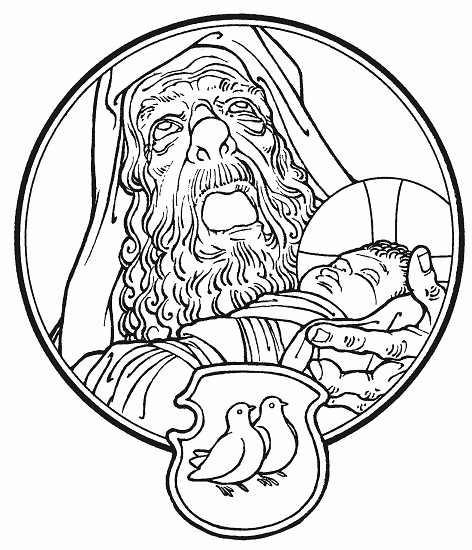Readings: Isaiah 11:1-5 | Galatians 4:1-7 | Luke 2:22-40
Text: Luke 2:33-40
Joseph and Mary marveled about what was spoken about their son by Simeon. The Song of Simeon, known to us as the Nunc Dimittis, summed up the longing of the people of God since the very entrance of sin into the world. About this child whom Mary carried in her arms, the prophet exclaimed that now, at long last, the Lord was releasing Him in peace. His Word—which was shorthand for the entire Old Testament—had now been fulfilled in the coming of this holy infant, now in the Temple. It was a promise which Simeon could see fulfilled, hold in his arms, and while holding this infant, bless God for accomplishing the long-promised mercy to a stiff-necked people.

Mary treasured all these things in her heart. But not everyone shared Simeon’s exultation at seeing Jesus. There were many more things that would also be spoken about Him as the child grew.
Is not this Joseph’s son? – Luke 4:22
Who is this who speaks blasphemies? Who can forgive sins but God alone? – Luke 5:21
“A great prophet has arisen among us!” and “God has visited his people!” – Luke 7:16
Who then is this, that he commands even winds and water, and they obey him? – Luke 8:25
He stirs up the people, teaching throughout all Judea, from Galilee even to this place. – Luke 23:5
Away with this man, and release to us Barabbas – Luke 23:18
But this man has done nothing wrong. – Luke 23:41
Did not our hearts burn within us while he talked to us on the road, while he opened to us the Scriptures? – Luke 24:32
All of these things were spoken by Israelites—the very recipients of God’s promised mercy. Some of them are true; others are false. But what is true about all of them is what Simeon also says: “Behold, this child is appointed for the fall and rising of many in Israel, and for a sign that is opposed…so that thoughts from many hearts may be revealed” (vv. 34-35). The coming of Israel’s Savior brought out what was in the hearts of all—whether faith, or unbelief.

The coming of Christ is a fulfillment of what is spoken by Isaiah: “14 And he will become a sanctuary and a stone of offense and a rock of stumbling to both houses of Israel, a trap and a snare to the inhabitants of Jerusalem. 15 And many shall stumble on it. They shall fall and be broken; they shall be snared and taken.”[1] Again, it is written in Psalm 118: “22The stone that the builders rejected has become the cornerstone.” There is no greater stumbling block for sinful men than Jesus.
In Johann Sebastian Bach’s Cantata 152, titled “Step Forward on the Way of Faith,” Lutheran poet, Salomo Franck, expresses this mystery of stumbling over the Rock, Jesus.

Step forward on the way of faith,
God has laid the stone
that bears and supports Zion.
Man, do not stumble against it!
Step forward on the way of faith![2]
In the post-modern, post-Christian world that we live in, absolutes are rejected. The Christian faith is expected to “coexist” with other monotheistic religions, and even with religions that confess a whole host of gods. Every person has his or her own opinion about God, and that’s just great to the world.
Even the Christian Church on earth is riddled with differing opinions, which manifest themselves in denominations. For example, it’s common to hear that a person can’t be saved until they open the door for Jesus,[3] while others confess with Scripture, “By grace you have been saved through faith. And this is not your own doing; it is the gift of God”[4]
Yet God’s perspective is quite different. “Behold, I am laying in Zion a stone of stumbling, and a rock of offense; and whoever believes in Him will not be put to shame”[5] God is the one who defines who He is and what is to be believed about Him. Ironically, no person would stand to have lies told about themselves, but we want to reserve the right to say whatever we want about God, even if it isn’t true.
But all that is put to rest by this Rock of Stumbling. God establishes His Son as the standard for truth: Man is a corrupt, abominable sinner. God is man’s Savior and Jesus Christ is the blood-guilt offering for our sins and the sins of the whole world.[6] This is most certainly true, and everything else is damnably false.
And this Rock is the only hope for lost and condemned sinners. He is the refuge of all who are convicted and dying. In the Cantata, Franck continues:

The Savior is appointed
in Israel for its fall and resurrection
The precious stone is without blame
if the evil world
injures itself on it
even falls over it to hell,
since the world runs against it so maliciously
and God’s favor
and grace does not recognize!
But blessed is
a Christian who has been chosen
who places the foundation of his faith on this cornerstone
since by this he finds salvation and redemption.
This Stone went out from Israel, to all the people of the earth. The preaching of Him went out to a world filled with evil men—including you and me. “And the one who falls on this stone will be broken to pieces; and when it falls on anyone, it will crush him.”[7] He breaks to pieces our attempts to repair our sins and escape the grave. He crushes our pride which waves our own laurels in God’s face. Anyone who trusts in these vanities will be cast into hell with prideful Satan.
But blessed is everyone who is called by God to salvation. Blessed are those who are crushed by this Stone, “not having a righteousness of [their] own,”[8] as St. Paul says in Philippians, “but that which comes through faith in Christ, the righteousness from God that depends on faith.” Blessed are you who have been crucified with Christ along with all your sin and evil desires, for you are raised to a pure life by faith in Him.
As for who will believe in or stumble on this Rock, that is entirely the business of God the Holy Spirit. We often trip on this question about the Rock, and wonder if there were another way that we could help fewer people to stumble. Should we change our worship? Should we change the Word we preach? Maybe if we just advertised more! But all of this is fumbling in the darkness of our hearts. The Holy Spirit is the Lord. He calls to faith, as the Son said in St. John, “The Spirit moves where He wills. You hear His voice, but you cannot tell where He is coming from or where He is going to.”[9] The Holy Spirit brings Jesus to us and us to Jesus. He is the Rock of salvation[10] for all who believe.
The Word of God proclaims this Rock. An evil world will writhe against it, trying to destroy the God who speaks and the people who proclaim His Word. But it is God Himself who calls people out of this world—you and me—to believe in this Rock, to see our sins on Him, to see our life in Him, and to have refuge in Him for eternity. May God preserve faith in our hearts in this evil world, till our Savior comes again in glory!
We pray in the words of the Aria from Cantata 152:

Stone, which surpasses all treasures,
help me, so that I at all times
through faith on you may place
the foundation of my salvation
and so that I may not injure myself on you,
Stone, which surpasses all treasures.
In the Name the Father and of the + Son and of the Holy Spirit. Amen.

[1] Isaiah 8:14-15
[2] Translated by Francis Browne. Cited from http://bach-cantatas.com/Texts/BWV152-Eng3.htm
[3] Based on the understanding of Revelation 3:20: “Behold, I stand at the door and knock…” that Jesus speaks to those who are outside of His Church. Yet those who are addressed are already called His members in v. 14.
[4] Ephesians 2:8
[5] Romans 9:33
[6] 1 John 2:2
[7] Matthew 21:44
[8] Philippians 3:9
[9] John 3:8
[10] Psalm 62:7










